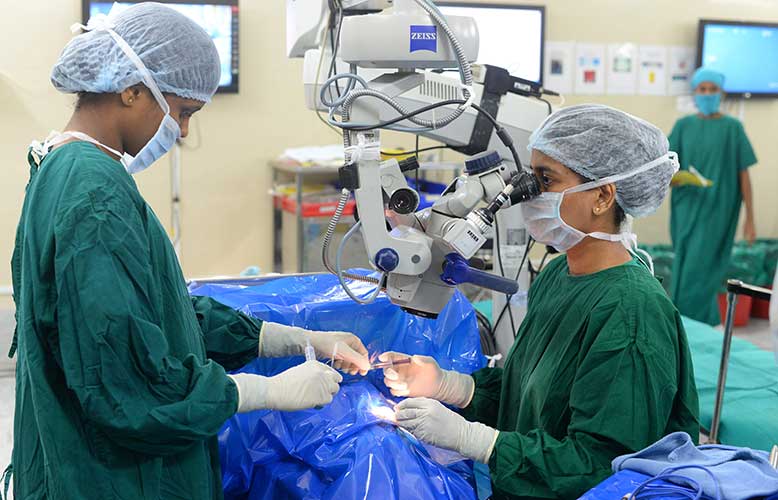- OT
- Professional support
- Health services
- An open door
An open door
OT finds out how the Aravind Eye Hospital in Tamil Nadu makes the most of limited resources to ensure that no patient is ever turned away
07 November 2017
Compassion and resourcefulness form a powerful combination at Aravind Eye Hospital in Madurai, a city with a name derived from the Hindu word for sweetness.
The hospital is located on the banks of the River Vaigai in an unassuming blue building that hosts more than 1.2 million outpatient appointments annually.
Aravind Eye Care System employee engagement manager, Dr Devendra Tayade, explained to OT that employees are guided by three principles: never turning patients away, providing the highest quality of care and self-reliance.
The values were set at the inception of the organisation by its founding members.
“The question ‘How can we provide better care to our patients?’ or ‘How can we do better?’ will be raised at least once during all of our meetings,” he shared.
Humble beginnings
The Aravind Eye Hospital was first founded in 1976 with a modest offering of 11 beds.
A network of eye care providers has grown from the hospital to form the Aravind Eye Care System, which incorporates six tertiary care centres, six secondary care centres, six outpatient examination clinics and 63 primary eye care centres.
The network performs about 12,500 outpatient visits and 1500 surgeries daily.
Dr Tayade highlighted that the desire to make the best possible use of limited resources has fuelled a creative approach at the hospital.
“While you try to work with empathy within the constraints, you also try to find another way. And that’s when innovation happens,” he emphasised.
Dr Tayade observed how Aravind Eye Hospital founder, Dr Govindappa Venkataswamy, instilled in staff the importance of creating efficient procedures, with well-planned systems making up for a scarcity of resources.

A sustainable system
Aravind Eye Care System staff are also mindful of the environmental impact of the organisation.
Dr Tayade told OT that the carbon dioxide emission per surgery across the network is 0.6kg – compared to 64kg in the UK.
By the numbers: ARAVIND EYE CARE SYSTEM
48 million outpatient visits and 5.5 million surgeries have been carried out since the organisation was founded in 1976.
2600 rural treatment eye camps are carried out each year.
8300 eye care professionals from 100 countries have receieved training.
The manufacturing arm, Aurolab, exports intraocular lenses to 160 countries worldwide.
Eye banks across the Aravind centres collected 5852 eyes during the past year, with 2613 used for surgery.
An emphasis is placed on recruiting the right people to work at Aravind and staff duties are regularly reviewed, Dr Tayade highlighted.
“Tasks that are routine and can be done by a person with lesser training or skills are shifted to them. Tasks that are not creating value are removed to make systems lean,” he explained.
Items that might otherwise be discarded are used in another capacity. For example, worn bedsheets are reused as mats, used printouts are turned into note pads and phacoemulsification cassette boxes are attached to slit lamps or repurposed as stationery containers.
All of the Aravind Eye Care System hospitals are installing solar panels, while several have introduced decentralised waste water treatment systems to recycle water.
Dr Tayade shared that at the Pondicherry hospital recycled 200,000 litres of the 250,000 litres used each day at the hospital.
The ophthalmic manufacturing arm of Aravind, Aurolab, is working to reduce the amount of waste generated through the packaging of lenses and surgical material.
Dr Tayade, who joined Aravind Eye Hospital Hospital Madurai after a stint as an intern, told OT that the hospital had provided him with a fertile learning ground.
“I’ve learnt and grown in my role. Ultimately, when you see your work making a positive impact that motivates you to carry on and do better,” he elaborated.
Improving lives
The potential impact of the care provided at Aravind Eye Hospital Hospital Madurai is far-reaching. Restoring vision increased the average life expectancy of patients while reducing the number of disability-adjusted life years.
“After a person loses sight, the next thing they lose is their dignity. When they come to Aravind and get their vision back, they don’t have to rely on anyone,” he emphasised.
Video credit: Aravind Eye Care System and Illustration: Neil Webb
Advertisement



Comments (0)
You must be logged in to join the discussion. Log in